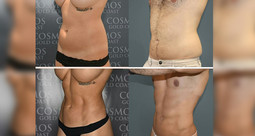The activated charcoal detox is a diet that some believe may assist with weight loss by detoxifying the body, though scientific evidence supporting these claims is currently lacking.
But does the evidence stack up? Will the charcoal detox help you shed the unwanted kilos and keep it off?
What is the charcoal detox?
Charcoal originates from burnt coconut shells and is commonly available in a capsule or powder form. It features small holes on the surface which makes charcoal a porous material that acts like a sponge.
Activated charcoal has been long used in emergency rooms for the treatment of accidental poisonings or drug overdoses. Administered at the right dose and promptly, charcoal binds to the drug reducing its absorption in the gut and detrimental side effects. Sorry, it doesn’t bind well with alcohol so it isn’t a miracle hangover cure!
More recently, charcoal containing ‘detox’ health products have flooded the market thanks to international nutritionists and health-conscious celebrities like Gwyneth Paltrow of Goop.
Some proponents of detox diets and charcoal-containing products suggest they might offer benefits like reducing bloating, brightening skin, or increasing energy, but it is important to note that these claims lack robust scientific backing, especially regarding their role in weight loss.
Charcoal powder is now so trendy, you can order a charcoal latte, icecream and even burger buns!
The charcoal detox program requires the individual to consume the activated charcoal in a powder mixed with water or juice or supplements for a period of time. Some detox guidelines advise avoiding food for at least 2 hours after consuming charcoal to reduce unwanted side effects.
Charcoal and weight loss: where is the evidence?
Do a web search and you’ll find plenty of sites claiming charcoal helps with weight loss through its detoxifying action.
One site (which will remain nameless) claims overweight and obese people often have a build-up of toxins in their gastrointestinal tract which would normally be cleaned via the liver and kidneys. However, these organs may not be functioning optimally.
The article goes on to state: removing these toxins and improving digestive function can help to normalise their metabolism and facilitate weight loss.
Unfortunately, there is no scientific evidence to back up these claims. In fact, there are no randomised controlled trials that assess the effectiveness of commercial detox diets like this in humans.
In a review of evidence into detox and fad diets, it has been found it’s not the program that results in weight loss. A decrease in weight can be credited to the reduced calorie intake and is likely to return once the individual stops detoxing.
Potential dangers of the charcoal detox
While it might be on-trend to consume Gwyneth Paltrow’s Charcoal Lemonade and cleanse your body, there are several reasons you should steer clear of charcoal detoxing products.
1. Activated charcoal binds to medications which can cause them to be less effective. Antidepressants, anti-inflammatory drugs and even the oral contraceptive pill (OCP).
2. Activated charcoal binds to the vitamins, minerals and antioxidants found naturally in foods. So, if you’re drinking your charcoal in a nutrient-dense smoothie, you’re not going to absorb any of the goodness thanks to the charcoal.
3. Activated charcoal can cause nasty side effects like constipation, diarrhea, nausea and vomiting, especially when consumed in repeated doses which are required in these weight loss detoxification programs.
4. Activated charcoal can cause charcoal deposits on the gut wall, serious GIT issues like bowel obstruction or complications such as abscesses.
In summary, while activated charcoal is used in certain medical treatments, its effectiveness in weight loss or detoxification through detox programs is not supported by current scientific evidence.
If you’re looking for a detox, you’re best to start with cleaning up your diet and consuming water and whole foods. Improving liver and kidney function can be achieved with nutrients and supplements under the guidance of a registered nutritionist or dietitian.
Best to leave activated charcoal to the medical staff in the emergency rooms.






